Understanding Parrot Diet: Essential Nutritional Insights
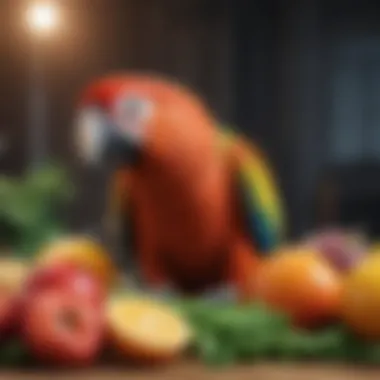
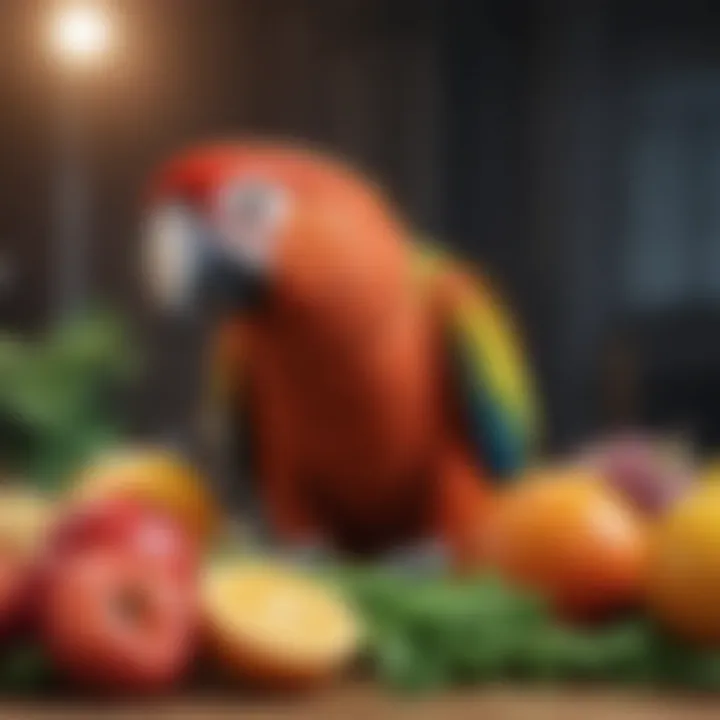
Intro
Understanding parrot nutrition is crucial for the well-being of these popular avian companions. Parrots are often robust birds, yet their health hinges significantly on a well-balanced diet. This guide covers the main aspects of parrot diet, from essential nutrients to common dietary mistakes.
The heart of parrot health starts with what they consume. This guide aims to provide pet bird owners, aspiring bird parents, and breeders with detailed insights into their dietary needs. It elucidates the specific food types that various parrot species thrive on while focusing on the general care practices that can enhance their day-to-day living. Keeping them nourished properly builds a foundation for their overall health.
Care Tips
Daily Care Routines
Daily care routines play a vital role in your parrot's health. This includes not only feeding them but also interacting with them regularly.
- Feeding schedule: Feed your parrot at the same time each day to maintain a routine.
- Social interaction: Spend time talking or playing with your bird; mental stimulation is a significant aspect of their health.
Cage Setup and Maintenance
A well-organized living environment is essential. The cage must be appropriate for the size and species of your parrot, promoting comfort and safety.
- Ensure enough space to move around freely.
- Include various perches and toys to keep them engaged.
Regular cleaning of the cage is critical. Waste accumulation can lead to health issues for your pet. Clean it weekly and replace the substrate accordingly.
Hygiene and Cleaning Practices
Good hygiene practices are important for preventing illness.
- Change water daily to ensure freshness.
- Remove uneaten food promptly to minimize bacteria growth.
Seasonal Care Adjustments
Seasonal changes can affect your parrot’s diet and habits. During heat, provide more water and possibly some fresh fruits. In cooler seasons, a bit extra warmth and favorable foods can aid in their comfort.
Nutrition Guides
Essential Diet Components
Parrots require a diverse diet rich in essential nutrients. Their diet should consist of the following elements:
- Fresh fruits and vegetables
- High-quality pellets
- Grains and seeds
Each of these components plays a different role in their nutritional intake.
Safe and Toxic Foods
Not all foods are safe for parrots. Toxic foods you must avoid include:
- Chocolate
- Avocado
- Caffeine products
Always research before introducing new foods.
Supplements and Treats
While a well-balanced diet is ideal, supplements can add to their nutrition. Be careful with treats; many can be high in sugar or fat. Consider using things like
- Desiccated seaweed for minerals
- Calcium blocks for bone health
Feeding Strategies for Different Species
Different bird species have unique dietary needs. For example, Eclectus parrots require more fruits in their diet because of their digestive system compared to Budgerigars. Learn specific demands based on the species you own.
A balanced diet can prolong the life of your pet parrot significantly.
Wellness and Health
Health should come first for every pet owner. Regular check-ups are a necessity, not an option.
Routine Health Checkups
Scheduling regular health checks helps in early illness detection. A qualified avian vet can assess general health through examinations and necessary tests to catch underlying afflictions.
Identifying Symptoms of Illness
Watch for signs of distress or discomfort, such as changes in their feathers, behavior, or appetite. Any shift in these areas warrants concern.
Preventative Care and Vaccinations
Vaccinations should be a part of your parrot's health regimen. Knowing the necessary vaccinations helps to protect against severe diseases.
Mental and Emotional Well-being
Mental health-free of boredom is fundamental. Consider how your parrot interacts with other birds and integrates within a family environment.
Enriching Activities
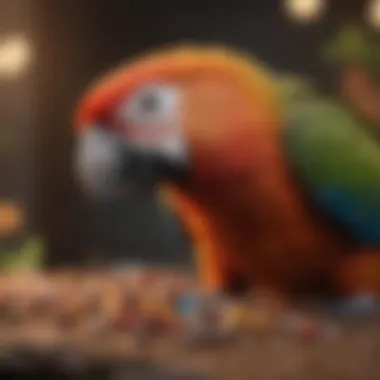
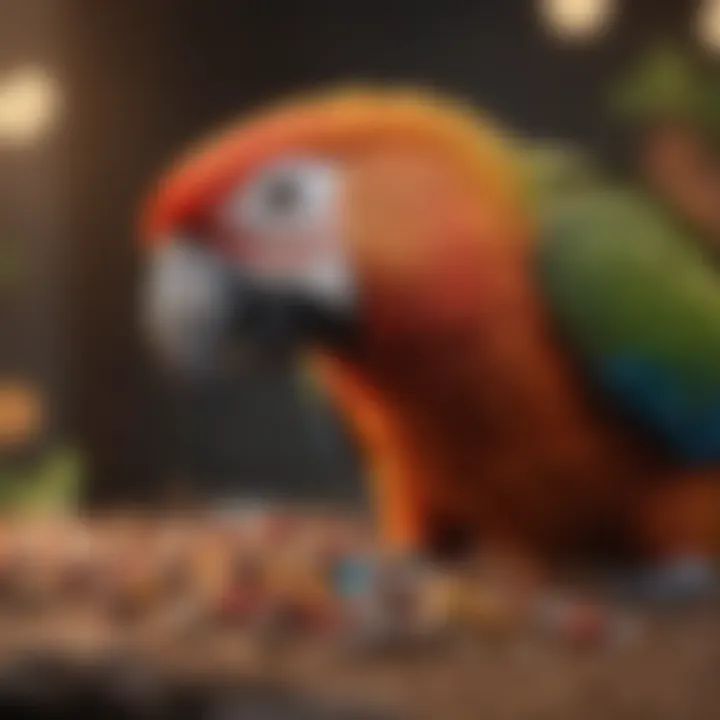
Lastly, enriching activities mold your pet’s mental landscape, helping counteract boredom.
Toys and Playtime Ideas
Encourage playtime with toys. Various textures and shapes stimulate their brains and keep them engaged.
Training and Tricks
Teach simple commands to engage their intellect. Birds are responsive to gentle positive reinforcement.
Outdoor Activities and Interaction
Outdoor excursions, under controlled conditions, can provide new stimulation and excitement when safely done.
DIY Projects for Mental Stimulation
Use household materials to create cervical enrichment. For example, creating foraging toys from cardboard mingles interaction with creativity.
This comprehensive overview serves as a resource for maintaining your parrots in peak condition. The fundamental insights provided here directly contribute to their welfare and happiness.
Foreword to Parrot Nutrition
Nutrition is a crucial aspect of parrot care that often gets overlooked by pet owners. When discussing the wellbeing of parrots, we must emphasize the role a balanced diet plays in their health and longevity. Understanding the nutritional needs of parrots is fundamental to providing them with a life that is not only long but also vibrant.
Proper nutrition does not simply mean feeding your parrot an occasional snack or relying solely on seed mixes. It involves knowledge of various food types and their interactions with specific parrot species. When we take the time to understand parrot nutrition, we lend support to their overall health, enhance their natural behaviors, and help reduce the risk of common diseases associated with poor feeding practices. By focusing on this essential element, bird lovers can create conditions that lead to a rich life for their avian companions.
Importance of Proper Diet
A proper diet is paramount for parrots, affecting several aspects of their health. Parrots need a variety of nutrients—proteins, vitamins, minerals, fats, and carbohydrates—to thrive. A well-rounded diet promotes not only physical health but also mental well-being. Various studies have indicated that dietary deficiencies can lead to problems ranging from feather plucking to behavioral disorders.
Additionally, maintaining a healthy diet can lead to:
- Stronger immune systems, helping parrots resist diseases.
- Better feather quality, contributing to vibrant coloration and health.
- Enhanced energy levels, allowing for normal behavioral activities.
As a pet parent, it is your responsibility to educate yourself on what constitutes a healthy diet. This knowledge can be instrumental in avoiding fazts in food selection.
Common Misconceptions About Parrot Feeding
There are several misconceptions regarding parrot feeding practices. Many people assume that feeding parrots seeds is adequate. In reality, seeds often lack important nutrients and can become detrimental to a parrot’s health. In a bird’s natural habitat, a varied range of foods is available. Thus, in captivity, it is vital to mimic this diversity.
Some common misconceptions include:
- Seeds Only: Many think seeds are enough. Nutritional experts recommend a balanced diet including vegetables and fruits.
- All Fruits Are Healthy: People may equate all fruits with health benefits, but some fruits can be high in sugar. Moderation is crucial.
- Ignore Portion Control: Owners might assume that their pets will self-regulate their food intake, but it’s essential to monitor portions to prevent obesity.
The consequences of clinging to these beliefs can significantly impact your parrot’s wealth. Giving your bird proper nutrition should not be treated like an afterthought, and assessing feeding practices will contribute to the overall health and happiness of your feathered friend.
A comprehensive understanding of parrot diet can lead to longevity and better quality of life.
Key Nutritional Components
Understanding the key nutritional components in a parrot's diet is vital for ensuring their health and longevity. Parrots require a mix of proteins, vitamins, minerals, fats, and carbohydrates to thrive. Collectively, these components perform various functions, such as energy provision, tissue repair, and immune system support. Addressing these important aspects allows you to design a diet that nurtures your parrot's physical and mental wellbeing.
Proteins
Proteins are essential for your parrot's overall growth and maintenance. They function as the building blocks of many biological processes, including muscle development and enzyme production. A sufficient protein intake is necessary especially during periods of growth or reproductive phases. Common sources include legumes such as chickpeas and lentils, as well as some commercially available pellets that should include quality protein sources.
Benefits of Proteins
- Muscle development: Proteins support strong muscle formation and proper function.
- Enzyme production: Various enzymes that assist in digestion and metabolism are protein-based.
- Immune support: Proteins play a role in developing antibodies that protect against infections.
Vitamins and Minerals
Vitamins and minerals perform many roles in a parrot's physiology. They are vital for maintaining healthy skins, feathers, and bones. Each vitamin has specific functions. For instance, Vitamin A supports vision and immune health, while Vitamin D is crucial for calcium absorption.
Minerals such as calcium and phosphorus are also integral for strong bones and reproductive health. It's often recommended to provide a balanced mix of fruits and veggies that are fortified in vitamins and minerals to meet these needs.
Considerations for Vitamins and Minerals
- Make use of leafy greens to contribute Vitamins A, C, and K.
- Use a specialized mineral block to ensure your parrot has access to critical minerals like calcium.
- Be cautious to not exceed dietary intake, as over-consumption of one vitamin may lead to deficiencies in another.
Fats and Carbohydrates
Fats offer a concentrated source of energy that is particularly beneficial to offer during colder months or when dealing with more active parrot species. Accessible from sources like avocados, nuts, and seeds, these fats also help with vitamin absorption, particularly fat-soluble vitamins. Also, carbohydrates serve as an excellent quick energy source.
Key Sources and Benefits
- Healthy fat sources: Nuts such as almonds and walnuts are fantastic options, while some seeds provide essential fatty acids critical for healthy coat and skin care.
- Carbohydrates: Grains—like oats or quinoa—supply everlasting energy but should not make up the primary part of a parrot’s diet.
The End
By introducing a balanced mix of these essential components, pet owners can contribute significantly to their parrot’s health, improving their lifespan and enriching overall happiness.
Types of Food Suitable for Parrots
Parrots exhibit a range of dietary needs influenced by their species, size, and individual preferences. Understanding the types of food suitable for parrots is essential for their health, longevity, and overall wellbeing. Balancing these diverse food options ensures that your pet parrot receives the nutrition necessary to thrive.
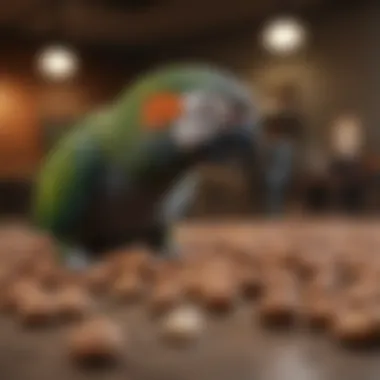
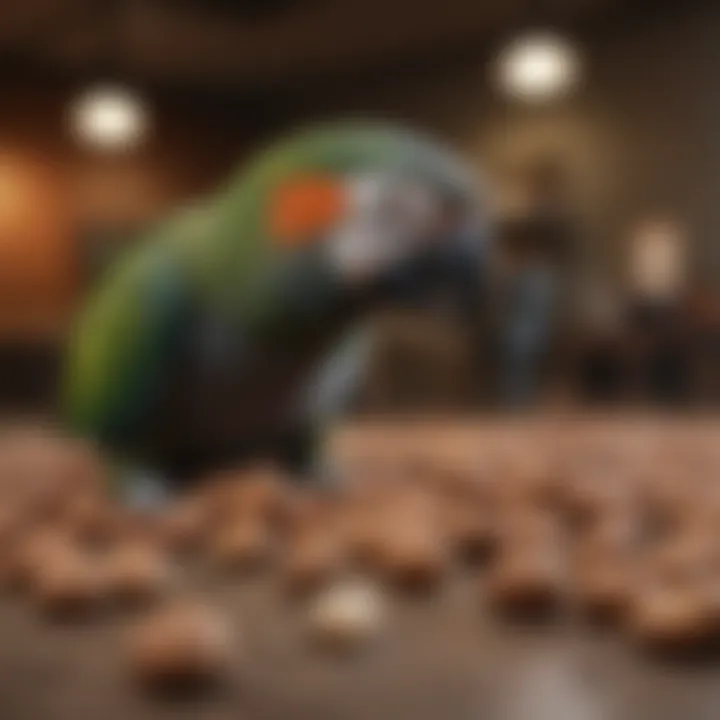
Seeds and Grains
Seeds and grains are often the primary components in the diet of many parrots. While they contain fats and some proteins, the high-caloric content can lead to obesity if not moderated. Seeds such as sunflower seeds, safflower seeds, and millet are prevalent for many bird species. However, they should not form the entirety of their meals.
It's advisable to mix different varieties of seeds and grains, allowing for a more diverse intake of nutrients. This mixture should include mostly low-fat seeds such as canary seed or oats, complemented by high-nutritional grains like quinoa or brown rice. Listening to the parrot’s preferences can also help fine-tune this component of their meal.
Fruits and Vegetables
Fruits and vegetables contribute essential vitamins and minerals to a parrot's diet. Citrus fruits, leafy greens, bell peppers, and carrots are some options that can be enjoyed by various parrot species. Including various colorful fruits and vegetables promotes variety in their diet and encourages natural foraging behaviors.
Be cautious with fruits high in sugar, such as bananas, as moderation is key. Fresh produce should be thoroughly washed and, in some cases, chopped to benefit small beaks. Settimegreater to observing any reactions or preferences will also improve your selection of fruits and veggies.
Commercial Pellets
Commercial pellets have gained popularity in recent years as they provide a balanced source of nutrition in a convenient form. High-quality products such as Harrison's Bird Foods or Kaytee offer meticulously formulated diets with specific nutritional profiles. These pellets aim to meet dietary requirements distinctly that seeds alone fall short of providing.
Utilizing pellets as a staple food gives a base value to your parrot's nutritional intake. However, ensuring the variety and supplementing with fresh foods enriches their diet. Checking product labels for harmful additives is essential for keeping your parrot healthy.
Treats and Supplements
Treats can enhance dietary intake by providing enrichment and training opportunities. Healthy treat options include unsalted nuts, dried fruits, or cooked beans. Nevertheless, treats should be offered sparingly as rewards, so they do not lead to weight issues from excess calories.
Moreover, nutritional supplements like calcium or vitamins can bolster diets that may fall short in particular areas. Recognizing specific health needs with the help of a vet ensures that your parrot gets the proper support when needed. Always consult with a professional before starting any treats or supplements.
Feeding Guidelines by Parrot Species
Feeding guidelines tailored to parrot species are vital for ensuring optimal health and longevity. Each species of parrot has unique dietary needs influenced by factors such as their size, metabolism, and natural habitat. Adopting an informed feeding strategy can prevent health issues related to malnutrition, overweight, or undernourishment. By focusing on species-specific diets, bird owners can provide their avian companions with a balanced mix of nutrients, enhancing their overall wellbeing.
Large Parrots
Large parrots, examples include African Grey and Macaws, have distinctive dietary needs. Their larger body size correlates with a need for more significant protein and fat intake. An appropriate diet might be around 15-20% protein, which can come from legumes, lean meats, or specialized parrot pellets developed for larger breeds.
Additionally, large parrots enjoy high-energy foods like nuts and seeds, though these should only comprise a smaller proportion of their diets to avoid excess fat build up.
When feeding fruits and vegetables, it is wise to focus on leafy greens and colorful, fibrous options like carrots to ensure they receive adequate vitamins and minerals. A few dry fruits can serve as treats, essential for bonding and positive reinforcement.
A crucial consideration is to offer variety but avoid sudden diet changes. Gradually introducing new food can encourage acceptance and lessen the risks of digestive discontents.
Medium Parrots
Medium-sized parrots, such as Conures and Quaker parrots, should have a more varied diet since they can be more selective eaters. Their nutritional needs typically amount to 12-15% protein, which can often be met through commercially designed bird pellets, along with a selection of fresh vegetables, fruits, and sprouted seeds.
With them, fresh foods should occupy a significant role. Offer mixed vegetables—cooked or raw promotes diversity—and limit starchy items. Fruits should be given moderately, treating them as a dessert rather than a staple.
Monitoring weight is essential since these parrots can become overweight quickly, leading to health problems. Also, they should receive plenty of interactive feeding opportunities. For example, manipulating toys that dispense food can replicate foraging habits in the wild, which is vital for their mental health.
Small Parrots
Small parrots, such as Budgerigars and Lovebirds, have significant differences in feeding needs compared to their larger relatives. Their diets can lean more on seeds and pellets, with a lower protein intake of about 10-12%. Budgies may thrive on high quality seed mixes and fortified pellets, but fresh foods should not be minimized. Small pieces of leafy greens and thinly sliced fruits often appeal to them.
Moreover, as small parrots tend to be quite active, their feeding schedule should encourage regular, smaller meals rather than large portions to support energy levels throughout the day.
A definitive tip is to clean the food and water containers every day, as small parrots can easily ingest bacteria that could harm their fragile systems. These creature do best in a generous, friendly environment that caters to their needs, routines, and personality.
Highlighted Consideration: Tailoring the feeding plans according to individual species ensures that every parrot remains healthy and spirited.
Practical Feeding Tips
Feeding parrots properly goes beyond simply placing food in a dish. These practical feeding tips are key for parrot owners seeking to enhance the health and happiness of their feathered companions. A balanced diet plays a vital role in keeping parrots energetic and functioning well. Additionally, practical strategies ensure parrots get all necessary nutrients in a feasible, effective way.
Creating a Balanced Diet Plan
Establishing a balanced diet plan for your parrot is crucial for its overall wellbeing. A well-rounded diet should contain a variety of food groups. Parrots are like many animals; they thrive with diversity in their food intake. It is essential to include fruits, vegetables, pellets, and occasional seeds for optimal health. Think about vitamin A and calcium sources, as these are commonly lacking in many diets.
Keep in mind that different parrot species have unique dietary needs. Research the specific requirements for your species. Setting up meal plans on a weekly basis can also help avoid monotony and ensure nutrients are consistently available. Draft a list of healthy foods and rotate their offerings regularly.
Monitoring Portion Sizes
Portion control is an underrated yet critical aspect of parrot care. Overfeeding can lead to obesity, while lack of food can result in malnutrition. Being mindful of portion sizes greatly impacts your parrot’s energy levels and long-term health. Usually, a parrot's size significantly influences how much food it requires daily.
Make use of measuring tools or familiarity with feeding ratios. Tracking what your parrot eats each day will provide insight into its dietary habits. Scheduling designated meal times also prepares them psychologically for eating and makes managing portions simpler.
Avoiding Junk Food
Providing healthy food options is necessary, but it is equally significant to avoid junk food. Parrots often favor high-sugar and fatty goods, which can lead to long-term health problems. Processed snacks high in artificial ingredients can damage their systems and are often nutritionally void. As a responsible owner, it is paramount to recognize what qualifies as junk food.
Avoid offering the following items:
- Chips
- Candy
- Bread
- Sugary cereals
- Alcohol and caffeine
Instead, keep healthy alternatives around as snacks. Fresh fruits, mixed nuts, and leafy greens provide tasty and nutrient-rich options. Educating yourself on what can really improve parrot health enables you to make better dietary choices for your pet.
It is vital to understand the implications of poor dietary choices on your parrot's health. An informed owner leads to a healthier bird.
Adhering to these tips will aid in maximizing your parrot's diet effectiveness. Monitoring daily intake and adjusting accordingly fosters a lifestyle that responds to your pet's true needs.
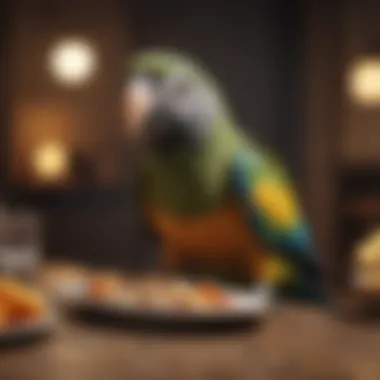
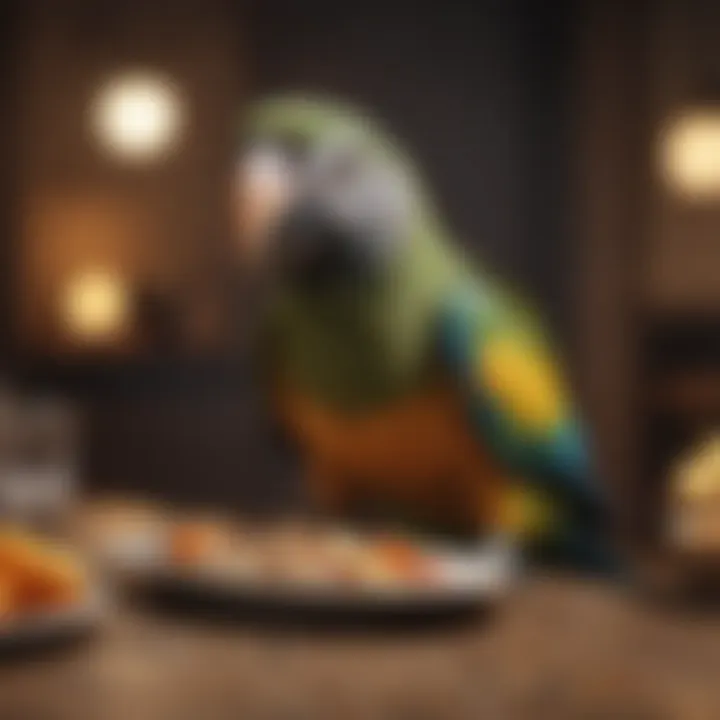
Hydration and Its Role
Proper hydration is essential for all living creatures, and parrots are no exception. Water impacts various physiological functions, including digestion, circulation, and temperature regulation. Just as a balanced diet is fundamental to a parrot's health, ensuring that they receive adequate water supports overall well-being. Understanding water requirements and sources contributes to providing comprehensive care for these lively animals.
Understanding Water Needs
Each parrot species has different hydration needs based on their size, age, activity level, and environment. Birds, in general, have a higher metabolic rate than mammals, which means they dehydrate more quickly. Sometimes, a parrot might not drink enough water due to stress or unfamiliar environments. It's vital to observe behaviors and ensure your feathered companion is getting the hydration they rely on.
A parrot typically consumes about 10% of its body weight in water daily, but this figure can change. Factors like hot climates or an increase in physical activity can elevate water needs. Regularly gauging your parrot's intake helps to identify any anomalies early.
Always remember: Adequate hydration is crucial for maintaining kidney health and preventing issues like obesity and liver disease in your parrot.
Signs of Dehydration
Observing signs of dehydration is critical for all bird owners:
- Dry feathers: This can indicate a lack of moisture.
- Lethargy: More subdued behavior than normal can signal health problems.
- Decreased droppings: A noticeable drop in droppings can be a sign of insufficient fluid intake.
- Listless behavior: Reduced curiosity or energy may stem from dehydration.
Taking action quickly upon noticing these signs can prevent serious health issues.
Clean Water Sources
Access to clean water is non-negotiable for all parrots. Stagnant or unfiltered water can lead to the growth of harmful bacteria, which may upset a parrot's sensitive digestive system or cause infections. Here are some insights into establishing excellent water cleanliness:
- Daily Refreshing: Change the water in your parrot's bowl daily. This maintains freshness and avoids algae growth. After replacing the water, ensure birds engage with it regularly.
- Bowl Variety: Not all parrots like to drink from a bowl. They may prefer a drinking bottle, which prevents spillage or contamination. Test both bowl and bottle to see which your parrot favors.
- Safe Materials: The container used should be non-toxic and easy to clean. Ceramic bowls often work well, as they are heavy enough to prevent tipping.
- Filter If Possible: If tap water contains chlorine or heavy metals, consider a filter. Filtered water can reduce potential health risks.
- Observe Drinking Habits: Keep an eye on how much water your parrot consumes. If they appear disinterested in drinking, it may warrant an investigation into their health and living conditions.
Maintaining clean and readily available water for your parrot is integral to ensuring its level of wellbeing. Responsible parrot ownership involves always being aware of their hydration needs and sources.
Common Dietary Mistakes
Understanding common dietary mistakes is vital for ensuring the health and well-being of parrots. Many parrot owners want to provide the best for their feathered companions. However, they often fall into traps caused by misunderstanding nutritional needs. Avoiding these mistakes can lead to a happier, healthier bird.
Over-reliance on Seeds
Seeds are often seen as a traditional staple for parrots, but they should not be the only food source. Many people mistakenly think that seeds meet all dietary requirements, but this is misleading. Seeds usually contain high levels of fats and low levels of other essential nutrients. Not providing a varied diet can lead to obesity and health issues, such as feather plucking or heart disease.
Instead of serving just seeds, mix in fruits, vegetables, and high-quality pellets. Varied diet supports better health and keeps the parrot from getting bored with its meals. It is worth noting that some seeds can be beneficial, but they should not dominate the diet. Focus on feeding balanced meals to maintain overall wellness.
Neglecting Fresh Foods
Fresh foods should be an essential art of a parrot’s diet. Many owners underestimate the importance of offering fresh fruits and vegetables. Fresh foods provide moisture, vitamins, and minerals that are crucial for a parrot's health. Lack of these fresh items can lead to nutritional deficiencies over time.
A variety of fresh produce gives birds vital nutrients and stimulates their natural behaviors. Common choices include leafy greens like kale, brightly colored peppers, apples, and carrots. Introducing new foods regularly helps create excitement around mealtime. Do not forget to wash fresh foods thoroughly to remove any pesticides or chemicals.
Ignoring Species-specific Needs
Parrots are not one-size-fits-all. Each species has unique dietary requirements, often related to their natural environments. Ignoring the specific needs of a parrot breed can have severe ramifications. Some large parrots require more nuts and specialized pellets compared to small parrots, who may need a higher fruit and vegetable intake.
Researching the particular needs based on your parrot's species is important for its dietary success. Understanding specific preferences and health needs influences what and how you feed. Reading resources related to your specific parrot type helps in achieving the best nutrition. Failure to cater to these species-specific requirements can result in health problems, affecting the longevity and quality of life of the bird.
Always consult with a vet who specializes in avian care. They can offer guidance tailored to fit the needs of your parrot.
Supplementary Feeding
Supplementary feeding can play a vital role in ensuring the overall health of parrots. Many pet bird owners focus on providing fresh fruits, vegetables, and high-quality pellets. However, it may be necessary to include nutritional supplements under certain conditions. These products can fill nutritional gaps, enhance health, and optimize the diet. Let’s examine when to consider these supplements and the types available in the market today.
When to Consider Supplements
Supplements are essential in certain scenarios. Pet owners should think about adding supplements when they notice
- Their parrot is not eating a balanced diet, especially if they are picky eaters, reluctant to try new foods, or overly reliant on one kind of food.
- Specific health issues arise. Certain health conditions may require additional nutrients not adequately supplied through food alone.
- A parrot is in a particular life stage, such as during molting, breeding, or recovering from illness. Nutritional boosts can support these stages more effectively.
- Young birds are in constant growth, needing extra vitamins not present in their diet.
In such situations, staying observant is crucial. Regular veterinary check-ups can identify if the bird lacks necessary nutrients.
Types of Nutritional Supplements
There are several categories of nutritional supplements suitable for parrots. Understanding these can aid in making more informed choices. Generally, owners may consider:
- Vitamins and Minerals: Essential for immune support and healthy biochemical processes, products like Avi-Calm or Avian Neutraceuticals Multivitamin can ensure these requirements are met.
- Probiotics: These support gut health and immune response. They can help balance gut flora, especially during changes in diet.
- Amino Acids: Supplements such as L-lysine are beneficial when specific amino acids are low in the diet. This can be common in seed-heavy diets.
- Calcium Supplements: These are especially important for breeding or laying hens, helping to strengthen eggshells.
Most importantly, it’s essential to consult a veterinarian before introducing any supplements. Too much of a particular nutrient can also cause harm. Each parrot has individual needs, and professional guidance can prevent mistakes.
Culmination
In this article, we explored the intricate details of parrot nutrition. All aspects of their diets have significant implications for their health and wellbeing. Proper nutrition directly influences a parrot's lifespan, vitality, and overall quality of life.
Impact of Proper Nutrition on Parrot Lifespan
The diet of a parrot plays a crucial role in determining its lifespan. A well-balanced diet ensures that parrots receive essential nutrients. These elements are vital for supporting integeral functions of the body. For example, adequate protein is essential for tissue repairs and muscle health. In addition, vitamins like A and D contribute to overall immune function and reproductive health.
Without proper nutrition, parrots are prone to various health issues. Common problems include obesity, feather plucking, and organ failure. It's evident that a diet rich in fruits, vegetables, and other integrated components can enhance their wellbeing.
Understanding that parrots thrive with varied and nutritionally adequate foods is critical. This awareness helps in crafting a diet that respects their environmental and social needs as well.
Encouraging a Healthy Relationship with Food
Establishing a positive relationship with food is crucial for the behavioral health of parrots. A varied diet not only nourishes the body but also engages mental stimulation. Introducing new fruits, vegetables, or safe human foods can create an encouraging eating environment.
A healthy relationship with food fosters curiosity rather than aversion. Discussing specific needs with avian veterinarians can help create comfortable feeding habits. It is advisable to avoid all hand-feeding of junk or unhealthy byproducts, which can inadvertently teach the bird poor eating habits.
Concrete actions, such as introducing puzzles or foraging toys, can enrich feeding times. This practice allows hypertension and stress to decrease, giving parrots positive associations with food moments.















